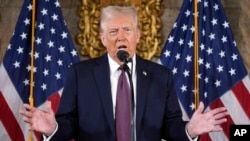As U.S. President-elect Donald Trump prepares to be sworn into office, African analysts weigh in on what governing for the second term-president may feel like for the continent compared to his first term.
U.S. President-elect Donald Trump’s first term included the launch of some initiatives for Africa. However, many people remember him for referring to the continent using degrading language. Edgar Githua is a professor of international relations at Strathmore University in Kenya.
“He called Africa a shithole, excuse my French,” said Githua.
Estimated at over 1 billion people, Africa’s population is growing fast and expected to reach 2.5 billion by 2050, according to various estimates.
It’s a big market that plays a key role in the global economy, Githua said, and in terms of business and trade, Trump may be interested in Africa but only because of the inroads China has made here.
“Since China is hellbent on capturing Africa as a business destination, Trump will come to Africa not so much because he cares about Africa but because he’s coming to counter Chinese influence on the African soil. So that fight, that proxy war, that geopolitical repositioning, in my view, is what could probably benefit Africa,” he said.
But Trump’s first term saw the birth of initiatives such as Prosper Africa, aimed at facilitating economic engagement between the U.S. and African nations.
Since its launch in 2019, the U.S. has helped close nearly 3,000 deals across 49 countries for a value of more than $120 billion, according to figures shared on the initiative’s website.
While every American president establishes his own policies, many programs - including Prosper Africa; AGOA or the African Growth and Opportunity Act; and PEPFAR or the U.S. President’s Emergency Plan for AIDS Relief – continue beyond the end of presidents’ terms because they have solid bipartisan support in Congress.
No matter who’s in power in Washington, countries need to redefine what they want and how they want to work with the new administration, Rwandan economic analyst Teddy Kaberuka told VOA.
And while Trump’s America First policy may suggest more focus on America, some emerging economies in Africa still can benefit, he said.
“Because, if he’s focused on boosting domestic production, obviously, the U.S. will import a lot of raw material from all over the world and most likely in Africa, being in minerals, being in agriculture,” he said.
Kaberuka said the Ukraine war has hurt African economies, especially the grain supply disruption it caused, triggering a shortage of about 30 million metric tons of grain in Africa in the first year of the war alone, according to the Atlantic Council, a policy research organization based in Washington.
He said Trump didn’t engage in wars during his first term and complimented the president-elect for publicly stating he aimed to help end to the Ukraine war shortly after he takes office.
“As an African and someone who has that overview of the global economy, of the African economy, the war we are facing, the consequences, I would say that people like me are excited because from the experience, [during] the Trump administration, there were less wars,” said Kaberuka.
In the Sahel, a region recently plagued by coups, the U.S. closed two military bases and withdrew from Niger last year at the request of a junta that staged a coup the prior year. Their presence, U.S. officials said, was to help the region’s counterterrorism efforts.
Analyst Rida Lyammouri, who’s done field work in the Sahel/Lake Chad Basin, is a senior fellow at the Policy Center for the New South, a Moroccan-based policy research firm in Washington.
“We are increasingly seeing this narrative, this perception that is changing, toward the West, accusing the West of being one of the problems why Africa has not seen significant ... economic development. The priority for the Trump administration is to find ways to … keep a positive image toward the U.S. and avoid what is currently happening, for example, to France in Francophone Africa,” he said.
Lyammouri said he doesn’t think the Sahel will be a priority for this new administration but if that was to be, what happened in Niger should be a lesson.
“It’s … a message to the U.S. going forward not to take things for granted. I think Niger has been a reliable partner in the region, but this decision shows that it doesn't mean it’s guaranteed that the partnership is going to be forever,” he said.
Trump will take the oath of office January 20.








